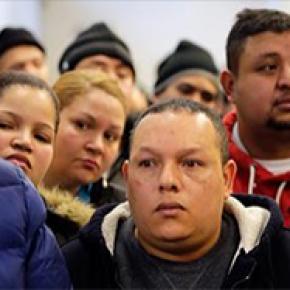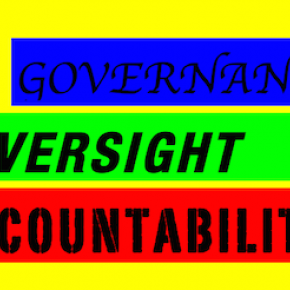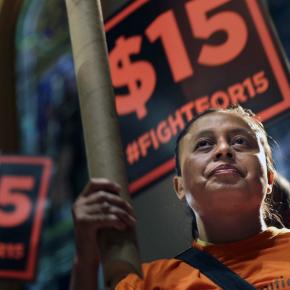Hundreds march on Capitol Hill to call for a DACA replacement
The Trump administration's decision to end the DACA program means thousands of undocumented individuals are on the...
The Trump administration's decision to end the DACA program means thousands of undocumented individuals are on the verge of being deported, despite having lived in the US for years. On Wednesday, protesters took to DC to call for the DREAM Act, which would build on DACA, creating a multi-phase process that would lead to permanent residency.
Read the full article here.
Recaudan fondos para Puerto Rico con fiesta en el Museo PS1
El Museo de Arte Moderno (MoMA, por sus siglas en inglés) recibió en su sede en Long Island City a la comunidad...
El Museo de Arte Moderno (MoMA, por sus siglas en inglés) recibió en su sede en Long Island City a la comunidad artística puertorriqueña, en un esfuerzo de recaudación de fondos organizado por la sociedad civil en apoyo a la comunidad afectada por el huracán María.
Lea el artículo completo aquí.
Retail and restaurant workers have the worst schedules. Oregon plans to change that.

Retail and restaurant workers have the worst schedules. Oregon plans to change that.
In the next upcoming battle for workers’ rights, activists aren’t asking for more money or more time off. They just...
In the next upcoming battle for workers’ rights, activists aren’t asking for more money or more time off. They just want workers to get a little advance notice about what their schedule will be.
Activists for better working conditions have scored victories lately. This year, 19 states increased their minimum wage — the result of a coordinated state-by-state campaign to take action on an issue that the federal government has basically ignored for a decade. And a handful of cities and states have passed laws requiring employers to offer workers paid parental leave.
Read the full article here.
2013 Race for Mayor: Low-Income New Yorkers
WNYC - March 1, 2013 - Brian Lehrer hosted a forum with seven mayoral hopefuls "2013 Race for Mayor: What's in it for...
WNYC - March 1, 2013 - Brian Lehrer hosted a forum with seven mayoral hopefuls "2013 Race for Mayor: What's in it for Low-Income New Yorkers?" sponsored by The Community Service Society (CSS) sponsored the event in partnership with Local 32BJ of the Service Employees International Union, the Center for Popular Democracy, and United New York.
Source
Big Demand for NYC Municipal ID Cards
Aljazeera America - January 14, 2015, by Wilson Dizard - New York City’s municipal identification card, launched...
Aljazeera America - January 14, 2015, by Wilson Dizard - New York City’s municipal identification card, launched Monday, quickly became a hot ticket, with thousands of residents eager to receive one lining up at distribution centers across the city — a volume that prompted city officials on Wednesday to start processing card applications by appointment only.
The nation’s largest city joins a handful of other municipalities — from San Francisco to Mercer County, New Jersey — that in recent years have issued their own ID cards to make life easier and safer for large populations of undocumented immigrants and anyone else in need of identification. Available free of charge to anyone 14 years or older in New York City, the cards also provide discounts at businesses and free access to some of the city's museums.
“It’s something good they should have done a long time ago," Alice King, 46, originally from Trinidad but a Brooklyn resident for the last 15 years, told local news site DNAInfo.
Based on its size alone, New York City’s program could become a model for municipal IDs in other U.S. cities, civil liberties advocates say. There are about 500,000 undocumented immigrants in New York City.
“It remains to be seen, but I think the intended effect is that New Yorkers will have a lot easier time accessing city services and being part of the economic life of the city,” said Emily Tucker, senior staff attorney with the Center for Popular Democracy, an advocacy group that published a report in 2013 hailing the use of municipal ID cards across the nation.
So far, nine U.S. municipalities issue ID cards, with most in the San Francisco or New York City metropolitan areas. Washington, D.C., has a version as well. Other cities — including Chicago and Phoenix — are looking into launching similar programs.
Supporters of municipal IDs, which were piloted in 2007 in New Haven, Connecticut, say that issuing the cards to undocumented residents fills a gap left by a lack of immigration reform in Congress.
They also say the IDs make everyone safer by allowing such residents to no longer be afraid to report crimes against them or others to police. Without identification, many undocumented immigrants fear risking deportation by speaking to authorities.
In New York City, police say they will accept the cards as an adequate form of identification, which Tucker said will “make interactions with police smoother.”
“Now police can issue a summons instead of arresting a person without ID for something like an open container violation, instead of taking them to the precinct to spend a night in jail,” she added.
The cards can help undocumented residents do simple things like open bank accounts, rent apartments, board flights and access medical help — tasks made far more difficult or even impossible without identification.
“We’ve heard of school districts where parents without ID are not able to pick up their kids from extracurricular activities,” said Layla Razvani, an attorney with the American Civil Liberties Union. “These parents are part of the community.”
Still, not everyone supports municipal ID programs. Their most vocal opponents argue that by issuing cards, municipalities are flagrantly disobeying federal laws that prohibit illegal immigration, aiding the undocumented by providing IDs to people who can’t prove they’re citizens.
“We don’t know who these people really are. We have to take their word for it. It makes it more difficult to enforce federal immigration law,” said Ira Mehlmann, a spokesman for the Federation for American Immigration Reform, a group that opposes the continued presence of undocumented immigrants in the U.S.
“They say it’s to stop them [undocumented immigrants] from being treated like second-class citizens. It’s an oxymoron. They aren’t citizens. They don’t have a legal right to be in the country,” he added.
Mehlmann particularly fears that undocumented residents could exploit municipal ID card programs to carry out acts of violence. Although he could not point to a single instance of a city ID being used in the commission of a crime, he said, “the fact that nobody with one of these IDs has committed a terrorist act yet doesn’t mean it doesn’t pose a threat.”
The New York Civil Liberties Union has also expressed skepticism about the city’s municipal ID program, wary that authorities might misuse the information provided by undocumented residents who are some of society’s most vulnerable.
NYCLU spokeswoman Jen Carnig said that the cards could make life easier for people but that police don’t have to provide the same level of probable cause to access the municipal IDs as they do for regular driver’s licenses. She credited the city with saying it would inform people whose information police have accessed, but she argued that the protections should be as strong as they are for citizens.
“No one should be subject to having their personal documents accessed by law enforcement or become subject to an investigation based on a hunch, and it’s possible that could be the case for some people,” she said.
Source
Post Navigation Report Finds Lack of Proper Fraud Oversight at Charters in State
LA School Report - March 24, 2015, by Craig Clough - California is extremely vulnerable to fraud at charter schools and...
LA School Report - March 24, 2015, by Craig Clough - California is extremely vulnerable to fraud at charter schools and as a result can expect to lose $100 million in wasted tax money in 2015, a new report released today finds.
The report from the Center for Popular Democracy, Alliance of Californians for Community Empowerment and Public Advocates found that there are “structural oversight weaknesses” in the state’s charter system.
Among the problems it found:
Oversight depends heavily on self-reporting by charter schools.
General auditing techniques alone do not uncover fraud.
Oversight bodies lack adequate staffing to detect and eliminate fraud.
California has the largest number of charter schools in the nation — 1,184, according to the California Charter Schools Association. The number in LA Unified grew this year to 285, 231 of which are independent.
The report recommends a few solutions, including requiring oversight agencies, such as the State Comptroller’s Office and Fiscal Crisis and Management Assistance Team, to conduct audits on charter schools once every three years, and not only when requested to do so.
“There’s no proactive system for auditing California’s charter schools by state officials… They wait until someone has whisteblowers come forward and the media has put something out, but there’s not a regular system for auditing schools,” said Kyle Serrette, director of education at the Center for Popular Democracy, in a call with reporters.
The report stated that over $81 million in fraud has been uncovered at charter schools to date, but that it is likely the “tip of the iceberg” and estimated the state will lose $100 million this year alone to waste, fraud and mismanagement at charters.
“We have a situation where we are losing millions of dollars to fraud in the charter sector every single year. We now know what the problem is,” Serrette said, adding that the backers of the report will be pushing state lawmakers for policy changes based on the findings of the report.
Serrette also said there are other states that do a better job of applying rigorous oversight of charters.
“Pennsylvania is a great example where the auditor general audits all of Pennsylvania’s charter schools every three to five years and the districts, which tend to be the authorizers there, they do the same thing,” Serrette said.
Click here to read the full report.
Source
The big 2016 minimum wage push just got a powerful new ally
A little over a year out from the presidential election, we already know the states where the fiercest battles will...
A little over a year out from the presidential election, we already know the states where the fiercest battles will likely be fought. But another electoral map is shaping up too: The states where voters will decide where to raise their minimum wage.
And soon, those pay-boosting ballot measures might have some serious money behind them. A large California union is seed funding an organization aimed at accelerating such campaigns around the country, seizing on growing public support for raising the minimum wage to heights that just one cycle ago would have seemed like total fantasy.
It’s called the Fairness Project, officially launching Thursday, and it’s already focusing on three jurisdictions: California, Maine and the District of Columbia, with potentially more to come as funding becomes available. And the group's main backer, the Service Employees International Union’s 80,000-person strong United Healthcare Workers local in California, says it’s talking with a handful more.
“This is the best value in American politics,” says SEIU-UHW president Dave Regan, who last year laid out a strategy to raise wages through ballot initiatives in the 24 states that allow them. “If you can amass $25 million, you can put a question in front of half the country that simply can’t be moved through legislatures because of big money in politics.”
The organization doesn’t have $25 million yet, just a couple million; Regan declined to specify exactly how much. SEIU headquarters, despite waging its own multi-million dollar “Fight for $15” campaign to raise wages around the country, has yet to pitch in (which may have something to do with the fact that Regan has had a testy relationship with SEIU’s president, Mary Kay Henry; SEIU declined to comment).
But Regan says he hopes that as union locals do their budgets for the 2016 campaigns, they’ll contribute, partly as a way to resuscitate the labor movement’s image. “Most of the discourse around unions is negative,” Regan says. "So the Fairness Project is saying, 'Look, we can win for tens of millions of people, just if we’re committed to doing this.'"
They’ve picked a soft target. According to the Ballot Initiative Strategy Center, minimum wage measures have been tried 20 times in 16 states since 1996, and all but two succeeded. The earlier victories came in waves, starting with the “living wage” movement in the 1990s. The campaigns even work in conservative states: in 2004, John Kerry lost Florida, but a minimum wage hike passed with 70 percent of the vote.
Even though those measures may not have made it through state legislatures, in combination, they do seem to add momentum for minimum wage hikes on the federal level — Congress responded with legislation in 1997 after a spate of ballot initiatives, and again in 2007 and 2008. Sometimes, just the credible threat of a ballot initiative can spur state houses to action where previously they had no interest, although the final result may end up watered down.
Most recently, in 2014, minimum wage measures passed in Arkansas, Alaska, Nebraska, and South Dakota. This latest wave is even more ambitious than the first and second, says Brian Kettenring, co-executive director of the Center for Popular Democracy — and it benefits from the narrative around inequality that arose during an economic recovery that delivered very little wage growth.
"In some ways the most powerful, because it’s the most visionary in terms of the Fight for $15,” Kettenring says. “What the project hits on that really makes sense is engaging inequality through the ballot initiative.”
Still, there’s no guarantee of success, and credible initiative campaigns do take money. They also have a lot of common needs, like polling, voter targeting, Website design, and message strategy. That’s where Ryan Johnson, the Fairness Project’s executive director, says the group can help.
“There are a lot of very expensive things with ballot initiatives,” Johnson says. “Things that work with presidential campaigns — could we take the lead in investing in those directly and at scale? It saves people a couple grand here, and couple grand there.”
It’s a model that’s worked for other causes, as well, such as marriage equality and medical marijuana. The ballot initiative process has long been used by both conservative and liberal groups, with varying degrees of scale, sometimes with the side effect of driving turnout for Democratic or Republican candidates.
The support will help campaigns that usually lack major corporate financing, and have to sustain themselves with volunteers and small dollar donations. Amy Halsted, of the Maine Peoples’ Alliance, says the organization received unprecedented financial support for its push to raise the state’s minimum wage to $12 by 2020 — it has raised about $150,000.
But it could use help with big-ticket items that are more efficiently provided by a central coordinating body, like consulting and tech support. And besides, a national campaign has a galvanizing effect in itself.
“One of the things we’re excited about is their ability to sustain that energy that exists nationally, and try to create an echo chamber,” she says. "The ability to connect all the movements I think is powerful and exciting, and makes our hundreds of volunteers feel connected to a big national campaign.”
The Fairness Project may not even be the only game in town when it comes to national support for minimum wage campaigns. Seattle billionaire Nick Hanauer, who helped bankroll the successful $15 an hour campaign there, isn’t contributing — he thinks the group has got the wrong message. “The majority of workers want the economy to grow,” he wrote in an e-mail, arguing that high wages are good for business. “Growth sells. Complaining about fairness does not.” (Regan says their initial focus groups responded well to the fairness message.)
But Hanauer may be supporting other campaigns independently — including a ballot initiative in his home state of Washington. “We hope to influence the messaging on a lot of the campaigns that will unfold in ’15 and ’16,” he says.
Ballots will likely becrowded with other measures, too — with more and more state legislatures controlled by Republicans, liberal groups are trying to put gun control and marijuana legalization questions before voters directly.
Facing that popular onslaught, the business community is weighing its options.
In some places, like Maine, the opposition might not be that fierce. Although business groups grumbled when the $12 statewide ballot initiative was introduced, the state’s biggest city — Portland — already passed a law that would raise the wage at least that high by 2018. On top of that, they’refighting a city vote on a local $15 minimum.
“$12 is not out of the question here, as long as it's statewide,” said Toby McGrath, who’s running the campaign against the $15 measure for the Portland Chamber of Commerce.
California, however, will see a more pitched battle. Business groups managed to stall a $13 minimum wage hike proposal in the legislature. Tom Scott, California’s state director for the National Federation of Independent Business, says there's still a lot of time yet to build an employer response to the ballot measure that labor backers say just got enough signatures to qualify.
“There’s going to be a huge coalition opposition a minimum wage increase,” he says. “This is a very long process. And the one thing about ballot initiatives — depending on how it’s worded, if it’s a yes or a no, in California, if I can in 15 seconds create confusion or questions, people will typically vote no.”
But if young people vote in large numbers, Scott worries they could be hard to beat. “I would just be fearful of the voter turnout,” he says, "and the demographics of who’s turning out.”
After publication, SEIU headquarters reached out to add the following statement:
SEIU works directly with our local unions in states to evaluate ballot initiatives on a state by state basis and determine which ones will advance better jobs and better wages for working people.
Source: Washington Post
Oakland spends far too much on policing
The numerous police killings of black citizens around the country in recent years have made us take a hard look at...
The numerous police killings of black citizens around the country in recent years have made us take a hard look at police brutality against black communities but law enforcement in Oakland has a particularly alarming history.
Between 2000 and 2016, police officers in Oakland have killed 90 people, three quarters of whom were black. Victims include 23-year-old Richard Linyard, who was killed after fleeing police at a traffic stop and 30-year-old Demouria Hogg, who was shot and killed by police after they found him unconscious in a car with a pistol.
Read the full article here.
Multiple Arrests In Midtown During May Day Protests Outside Banks

Multiple Arrests In Midtown During May Day Protests Outside Banks
Hundreds of labor and immigrant advocates marched through east midtown early Monday in a demonstration against...
Hundreds of labor and immigrant advocates marched through east midtown early Monday in a demonstration against corporations which they say are profiting from President Trump's agenda—one of a series of May Day protests scheduled to take place throughout the city (and beyond) on Monday.
The specific targets of this action, according to organizers from Make The Road New York, are the Wall Street banks that help finance private prisons and immigrant detention centers. To that end, organizers said twelve protesters were arrested for peaceful civil disobedience while blocking the entrances outside of JPMorgan Chase, which is one of the companies named in Make The Road's and the Center for Popular Democracy's Backers Of Hate campaign.
Read full article here.
Advocacy Groups Call for Closer Scrutiny of Charter Schools
Trib Total Media - October 1, 2014, by Megan Harris - Three groups with union affiliations on Wednesday pointed to the...
Trib Total Media - October 1, 2014, by Megan Harris - Three groups with union affiliations on Wednesday pointed to the criminal case against ousted PA Cyber Charter School founder Nick Trombetta as an example why the state's nearly 180 charter schools need better oversight and stronger accountability.
The Center for Popular Democracy, Integrity in Education, and Action United of Philadelphia and Pittsburgh issued a report that alleges Pennsylvania charter schools defrauded taxpayers out of more than $30 million. That figure is an aggregate of cases brought by whistleblowers and media exposés, according to the authors.
Pennsylvania Coalition of Public Charter Schools executive director Robert Fayfich said in a prepared statement that “the report draws sweeping conclusions about the entire charter sector based on only 11 cited incidents in the course of almost 20 years, while ignoring numerous alleged and actual fraud and fiscal mismanagement in (traditional) districts over that same time period.”
Trombetta, who investigators allege illegally funneled $1 million from school coffers and deferred taxes on an additional $8 million in personal income, pleaded not guilty to 11 counts of mail fraud, bribery, tax conspiracy and filing false tax returns last year. Hearings are ongoing.
Fayfich said, “Fraud and fiscal mismanagement are wrong and cannot be tolerated, but to highlight them in one sector and ignore them in another indicates a motivation to target one type of public school for a political agenda.”
The groups' report urges state officials to temporarily suspend the approval process for new charter schools, investigate existing ones, and shift from standard audits to forensic audits.
School districts paid more than $853 million in tax dollars to charters serving 128,712 students in 2013-14. Almost 4,000 Pittsburgh students attended 33 charter schools the same year.
Source











2 months ago
2 months ago